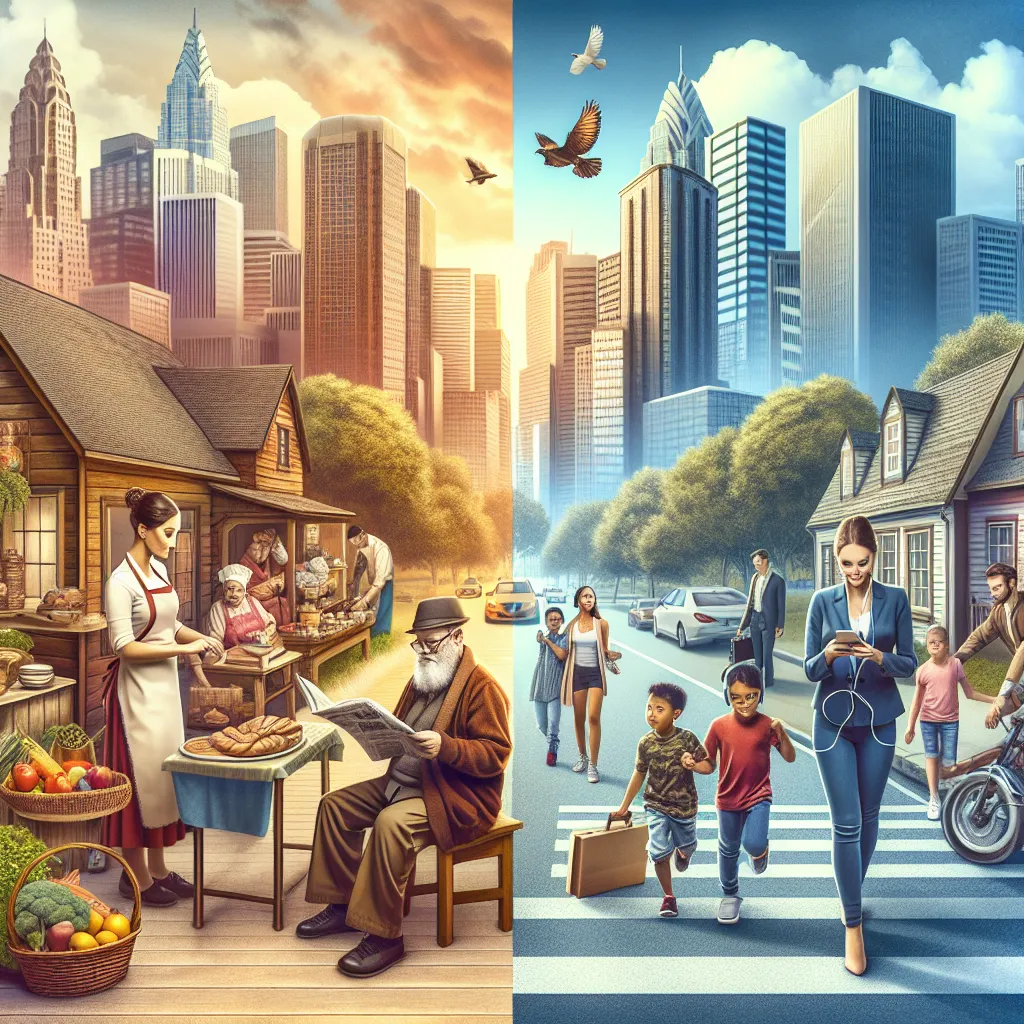As an experienced IELTS instructor, I’m thrilled to share with you a practice reading passage on the topic of “Urbanization and the Decline of Local Communities.” This subject has been a recurring theme in IELTS exams, and given its relevance to modern society, it’s likely to appear in future tests as well. Let’s dive into a comprehensive practice session to enhance your reading skills and prepare you for success in the IELTS Reading module.
Nội dung bài viết
Introduction to the IELTS Reading Test
The IELTS Reading test assesses your ability to understand and interpret written English. You’ll have 60 minutes to answer 40 questions based on three passages of increasing difficulty. Today, we’ll focus on a passage about urbanization and its impact on local communities, a topic that has featured prominently in past IELTS exams and continues to be relevant in our rapidly changing world.
 Urban landscape transformation
Urban landscape transformation
Practice Passage: The Changing Face of Communities
Reading Passage
Urbanization, the process by which rural areas become urbanized as a result of economic development and industrialization, has been a defining trend of the 21st century. While this phenomenon has brought about numerous benefits, including increased economic opportunities and improved access to services, it has also had a profound impact on local communities, often leading to their decline.
The rapid growth of cities has led to a mass exodus from rural areas, as people seek better job prospects and higher standards of living. This migration has resulted in a brain drain from smaller communities, with young, educated individuals being the most likely to leave. As a consequence, many rural areas are left with aging populations and diminishing workforces, making it challenging to maintain local economies and essential services.
Moreover, the expansion of urban areas often comes at the expense of agricultural land and natural habitats. As cities grow, they encroach upon surrounding rural areas, leading to the loss of farmland and green spaces. This not only affects food production but also disrupts ecosystems and biodiversity, further eroding the character of rural communities.
The rise of big-box stores and online shopping has dealt another blow to local communities. Small, independently-owned businesses that once formed the backbone of rural economies are struggling to compete with large corporations and e-commerce giants. This has led to the closure of many local shops and services, leaving once-vibrant main streets eerily quiet and further diminishing the sense of community.
Technology, while connecting people globally, has paradoxically contributed to the erosion of local social ties. Social media and digital communication have replaced face-to-face interactions, reducing the frequency and quality of personal connections within communities. This shift has weakened social cohesion and community engagement, particularly affecting smaller towns and villages where strong interpersonal relationships were once the norm.
However, it’s not all doom and gloom. Some communities are fighting back against these trends, implementing innovative strategies to revitalize their local economies and strengthen community bonds. Initiatives such as farmers’ markets, community-supported agriculture, and local festivals are helping to preserve cultural heritage and foster a sense of belonging. Additionally, some rural areas are leveraging technology to their advantage, using remote work opportunities to attract young professionals seeking a quieter lifestyle without sacrificing career prospects.
As urbanization continues to reshape our world, finding a balance between progress and preservation will be crucial. The challenge lies in harnessing the benefits of urban development while maintaining the unique character and social fabric of local communities. Only through conscious effort and innovative solutions can we hope to create a future where urban growth and community vitality coexist harmoniously.
Questions
1-5. Do the following statements agree with the information given in the reading passage?
Write
TRUE if the statement agrees with the information
FALSE if the statement contradicts the information
NOT GIVEN if there is no information on this
- Urbanization has only negative effects on rural communities.
- Young, educated individuals are more likely to move from rural to urban areas.
- The expansion of cities leads to a decrease in agricultural land.
- Online shopping has benefited small businesses in rural areas.
- All rural communities are experiencing population decline due to urbanization.
6-10. Complete the sentences below.
Choose NO MORE THAN TWO WORDS from the passage for each answer.
- The movement of people from rural to urban areas in search of better opportunities is referred to as a __.
- The loss of farmland and green spaces due to urban expansion affects both food production and __.
- Large corporations and __ are making it difficult for small, independent businesses to survive.
- The use of __ has reduced face-to-face interactions within communities.
- Some rural areas are using __ opportunities to attract young professionals who want a quieter lifestyle.
Answer Key and Explanations
-
FALSE – The passage mentions both benefits and drawbacks of urbanization.
-
TRUE – The text states, “young, educated individuals being the most likely to leave.”
-
TRUE – The passage mentions, “As cities grow, they encroach upon surrounding rural areas, leading to the loss of farmland.”
-
FALSE – The text indicates that online shopping has negatively impacted small businesses.
-
NOT GIVEN – The passage doesn’t state that all rural communities are experiencing population decline.
-
brain drain
-
ecosystems
-
e-commerce giants
-
social media
-
remote work
Common Mistakes to Avoid
- Overgeneralizing: Be careful not to assume information that isn’t explicitly stated in the text.
- Misinterpreting negatives: Pay close attention to negative statements and their implications.
- Overlooking synonyms: Remember that the passage may use different words to express the same concept as in the questions.
- Rushing: Take your time to read the passage carefully and understand the context of each statement.
Key Vocabulary
- Urbanization (noun) – /ˌɜːrbənaɪˈzeɪʃən/ – the process by which towns and cities grow larger as more people come to live and work in them
- Exodus (noun) – /ˈeksədəs/ – a situation in which many people leave a place at the same time
- Encroach (verb) – /ɪnˈkrəʊtʃ/ – to gradually cover more and more of an area
- Paradoxically (adverb) – /ˌpærəˈdɒksɪkli/ – in a way that seems strange or contradictory
- Revitalize (verb) – /ˌriːˈvaɪtəlaɪz/ – to give new life or vigor to something
Grammar Focus
Pay attention to the use of present perfect tense in the passage, for example:
“Urbanization… has been a defining trend of the 21st century.”
This tense is used to describe actions that started in the past and continue to have relevance in the present.
Tips for IELTS Reading Success
- Practice active reading: Engage with the text by highlighting key points and making mental summaries as you read.
- Improve your vocabulary: Regularly learn new words and their contextual usage to better understand complex texts.
- Time management: Allocate your time wisely between reading the passage and answering questions.
- Skim and scan: Use these techniques to quickly locate specific information in the text.
- Read the questions first: This can help guide your reading and focus your attention on relevant information.
Remember, consistent practice is key to improving your IELTS Reading score. Try to read a variety of texts on different subjects to broaden your understanding and vocabulary. For more practice on urban-related topics, you might find our articles on urbanization’s effect on local economies and urban development and population growth helpful.
By mastering these skills and strategies, you’ll be well-prepared to tackle any reading passage in the IELTS exam, including those on complex topics like urbanization and community dynamics. Keep practicing, stay curious, and you’ll see improvement in no time!


